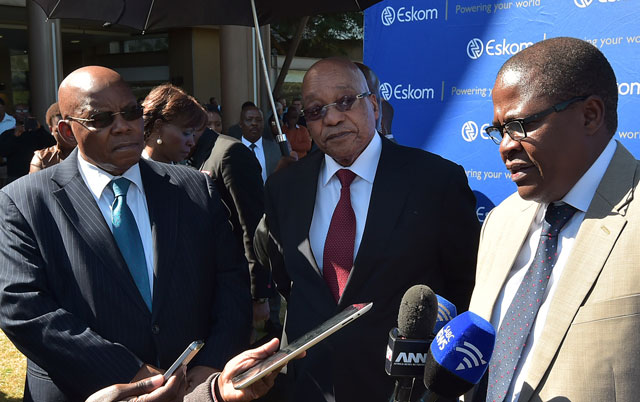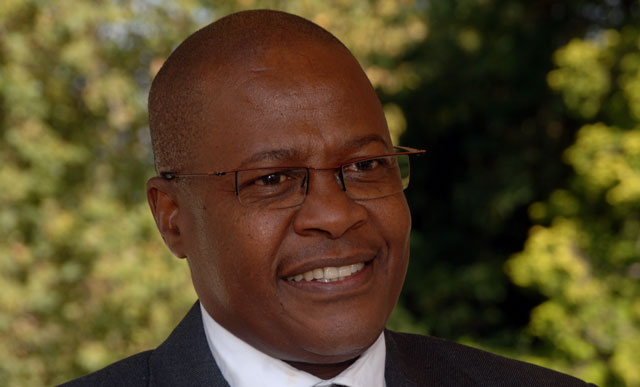Eskom chairman Ben Ngubane admits in court papers that the Eskom Pension and Provident Fund (EPPF) rules do not permit the large pension payout the board tried to wangle for its CEO Brian Molefe.

This was revealed in an affidavit filed by Ngubane in answer to an application by the Democratic Alliance to have the decision to reinstate Molefe reviewed and set aside.
Ngubane admits in his affidavit that a resolution board committee adopted in February 2016 for Molefe’s benefit was wrong and could not be implemented when the board approved Molefe’s purported early retirement in November last year.
The Eskom board does not have the authority to change EPPF rules and to attempt to do so would compromise the independence of the EPPF, which is governed by a board of trustees acting in terms of the Pension Fund Act.
He further admits that the board quoted the wrong EPPF rules in its letter approving Molefe’s “early retirement”. The rules quoted refer to retrenchment.
The EPPF, as a result, acted in terms of the wrong rules when it calculated Molefe’s R30m pension payout that was later declined by public enterprises minister Lynne Brown.
Ngubane nevertheless made no mention of these “errors” when the board and Brown were called to explain Molefe’s controversial reinstatement on Tuesday.
In his affidavit, Ngubane states that all was done in good faith.
He explains that Molefe was appointed as Eskom CEO on 1 October 2015. Brown approved his remuneration package a month later, stating that the appointment would be for five years only. No mention was made at that stage of any extraordinary pension benefits.
A letter was sent to Molefe to confirm his appointment and Molefe signed acceptance.
Only thereafter while preparing his employment contract, Ngubane states that Eskom sent a letter to Brown explaining that Molefe would lose out on pension benefits due to the short-term contract. Eskom and Molefe initially envisaged an open-ended contract term.
The purported retirement from my employment with Eskom was therefore not effective, having been materially influenced by our common error
Ngubane proposed that Eskom should “bridge the gap” by granting Molefe pension benefits to the age of 63 at the end of his contract even though he would only have been 53 by then. That would require that the penalties prescribed by the EPPF rules for earlier retirement be waived, and he proposed that Eskom should carry the cost of such penalties as well as the benefits for the extra 10 years’ pension.
Ngubane does not state whether Brown ever recognised receipt of the letter or responded to it. Neither does she mention it in her affidavit.
Three months later, in February 2016, the board’s people and governance committee adopted a resolution to give effect to the proposal sent to Brown, which would apply to all executive directors appointed on short-term contracts. The committee is headed by Eskom director and former AHI president Venete Klein.
Thereafter, on 15 March 2016, Molefe signed his employment contract.
After the release of former public protector Thuli Madonsela’s “State of Capture” report, Molefe wrote a letter to the board requesting early retirement. He specifically cited the resolution earlier adopted by the board committee.
In its letter accepting Molefe’s request, dated 24 November, Eskom according to Ngubane quoted the wrong EPPF rules. This created the impression that Molefe was in fact retrenched. That was also communicated to the EPPF, which processed Molefe’s departure in terms of the rules applicable to retrenchments.
The EPPF made the necessary calculation and Eskom paid R30m to the fund to ensure other members are not prejudiced.
Money not received
Molefe in his affidavit in response to the DA application, states that he has not received R30m.
According to a letter from the EPPF attached to his affidavit, his benefits included a lump sum of R9,7m, which includes tax payable of R1,9m and a monthly pretax pension of R111 866,17.
It was only after Brown’s press release following an article in the Sunday Times revealing the R30m benefit that the whole scheme was revisited. Brown in the press release stated that she declined the payment since she “found the argument presented by the board on why the pension arrangement was conceived lacking in legal rationale”.

According to Ngubane, the Eskom board then met and “having considered legal advice received, concluded that the early retirement agreement had legal impediments to its implementation and therefore had to be rescinded and the status quo restored”.
He says the agreement between Eskom and Molefe regarding his early retirement “was concluded in good faith, but on terms which, insofar as it related to pension benefits, could not be implemented”.
The EPPF did not permit retirement before the age of 55, says Ngubane. Eskom had mistakenly acted on the basis of the board committee resolution, which was in conflict with the EPPF rules, he admits.
The board passed a resolution to rescind its decision to accept Molefe’s “early retirement” and set about to restore the status quo, which included getting its R30m back. After negotiations, Molefe agreed to repay the amounts he received and resume his duties.
Eskom and Molefe agreed to treat the period between 1 January 2016 and 15 May 2016, when Molefe was “retired” from Eskom, as unpaid leave. During this period, he served as an ANC MP.
Brown in her affidavit states that the board did not need her approval for rescinding its decision and reinstating Molefe, but did so as a matter of courtesy.
After weighing the options, she approved.
Molefe in his affidavit states that his original employment never came to an end when he left Eskom at the end of 2016, because both he and Eskom acted on the mistaken belief that he was eligible for early retirement. “The purported retirement from my employment with Eskom was therefore not effective, having been materially influenced by our common error,” he states.
He says he agreed to repay any pension benefits he received.
He states that he did not attend the board committee meeting where the resolution relating to the early retirement was passed and never even checked the EPPF rules before the controversy started in April.
Molefe states that he only agreed to return to Eskom if the board could assure him that his return would be lawful.
The DA application will be heard on 6 June.
- This article was originally published on Moneyweb and is used here with permission




